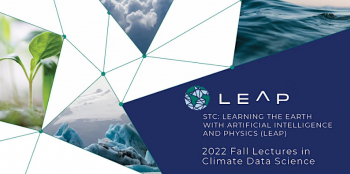Seminar “Learning Data-driven Subgrid-Scale Models for Geophysical Turbulence”

The atmospheric and oceanic turbulent circulations involve a variety of nonlinearly interacting physical processes spanning a broad range of spatial and temporal scales. To make simulations of these turbulent flows computationally tractable, processes with scales smaller than the typical grid size of general circulation models (GCMs) have to be parameterized.
Recently, there has been substantial interest (and progress) in using deep learning techniques to develop data-driven subgrid-scale (SGS) parameterizations for a number of key processes in the atmosphere, ocean, and other components of the climate system. However, for these data-driven SGS parameterizations to be useful and reliable in practice, a number of major challenges have to be addressed. These include:
- instabilities arising from the coupling of data-driven SGS parameterizations to coarse-resolution solvers,
- learning in the small-data regime,
- interpretability, and
- extrapolation to different parameters and forcings.
Using several setups of 2D turbulence, as well as two-layer quasi-geostrophic turbulence, and Rayleigh-Benard convection as test cases, we introduce methods to address (1)-(4). These methods are based on combining turbulence physics and recent advances in theory and applications of deep learning. For example, we will use backscattering analysis to shed light on the source of instabilities and incorporate physical constraints to enable learning in the small-data regime. We will further introduce a novel framework based on spectral analysis of the neural network to interpret the learned physics and will show how transfer learning enables extrapolation to flows with very different physical characteristics.
Time permitting, we will briefly mention some of the advances in supervised and semi-supervised learning of the SGS models, as well as the use of equation-discovery techniques. In the end, we will discuss scaling up these methods to more complex systems and real-world applications, e.g., for SGS modeling of atmospheric gravity waves. This presentation covers several collaborative projects involving Yifei Guan (Rice U), Ashesh Chattopadhyay (Rice U), Adam Subel (Rice U/NYU), Laure Zanna (NYU), and Andrew Ross (NYU).
Bio: Pedram Hassanzadeh is an Assistant Professor at the Departments of Mechanical Engineering and Earth, Environmental and Planetary Sciences at Rice University. He received his MA in Mathematics and PhD in Mechanical Engineering from UC Berkeley, and was a Ziff Environmental Flow at the Harvard University Center for the Environment and Department of Earth and Planetary Sciences until 2016. His research is at the intersection of climate change, extreme weather, data science, and geophysical fluid dynamics. He has received an NSF CAREER Award, ONR Young Investigator Award, and Early Career Fellowship from the National Academies Gulf Research Program.
Time: 3:00 PM EST
Free!
